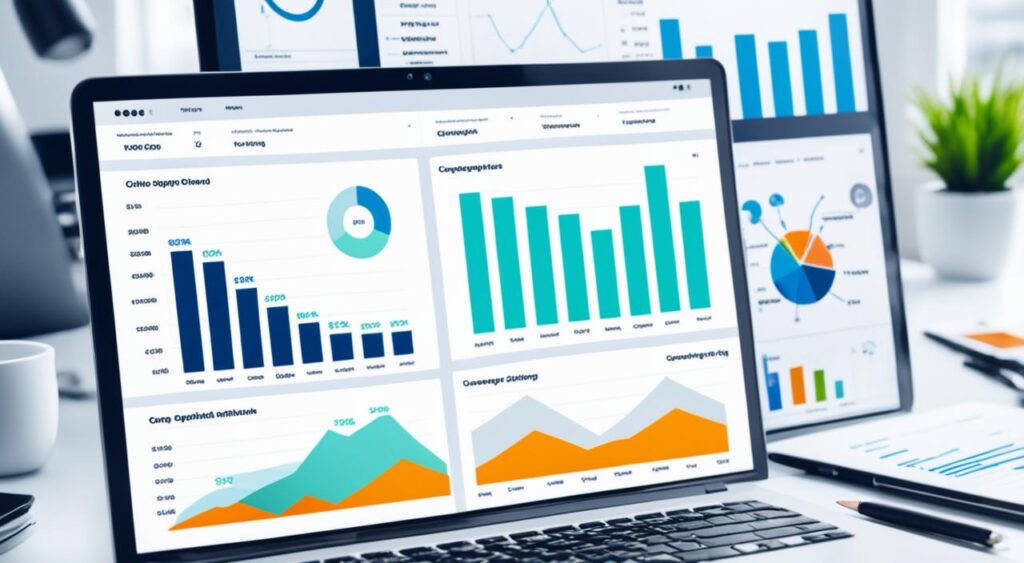Imagine sitting at the helm of a ship, navigating the vast digital ocean without a compass or a map. That’s what running a website without mastering SEO analytics might feel like. In an ocean brimming with competitors, using the fine-tuned instruments of SEO data analysis can mean the difference between drifting aimlessly and charting a course to success. Think of website analytics for SEO as your navigational chart, pointing out where the currents of online traffic are flowing and which routes may lead to undiscovered territories filled with potential customers.
With SEO performance tracking, you set your sights on a constellation of data that guides you to optimize your online presence. It’s no longer adequate to cast your net wide and hope for the best. Today’s digital marketers must be savvy fishermen who know the sea’s secrets, understand the behavioral patterns of their aquatic audience, and revitalize their strategies based on analytical insights.
To that end, your mission is clear: Embark on a journey through the intricacies of SEO analytics to uncover the mysteries behind soaring website traffic and unrivaled online visibility.
Key Takeaways
- Grasping SEO analytics is akin to having a trusted map in the vast digital landscape.
- SEO data analysis allows precise targeting and understanding of user traffic for better online navigation.
- Strategic website analytics for SEO inform decisions that lead to significant improvements in online visibility.
- Effective SEO performance tracking serves as a compass, guiding towards more successful SEO strategies.
- Being well-versed in SEO analytics is a fundamental cornerstone for any modern entrepreneur or marketer.
Understanding the Fundamentals of SEO Analytics
At the core of every successful online marketing strategy lies a robust understanding of SEO analytics. It is crucial for businesses aiming to enhance their online presence and drive more traffic to their websites. By comprehending and applying the insights derived from SEO analytics, you can significantly improve your website’s search engine rankings and overall digital performance.
Defining SEO Analytics and Its Importance
SEO analytics is a comprehensive approach to collecting and examining data related to your website’s performance in search engines. It encompasses a variety of metrics and tools that help you understand how visible your website is in search engine results pages (SERPs), how users find and interact with your site, and what steps you can take to improve your site’s performance. Essentially, employing search engine optimization analytics is about leveraging data to make informed decisions that can lead to better SEO results and a more efficient allocation of your marketing resources.

Key Components of Search Engine Optimization Analytics
Understanding the key components that drive SEO analytics is paramount for anyone involved in digital marketing. These components not only guide you in measuring current performance but also in forecasting future SEO trends and behaviors. Here, we will delve into the most critical aspects you should focus on:
| SEO Analytic Component | Definition | Significance |
|---|---|---|
| Traffic Analysis | The study of user visits to your site. | Helps to discern the volume and source of your website visitors. |
| Conversions | The actions users take that fulfill your site’s objectives. | Indicates the effectiveness of your site in prompting desired user behaviors. |
| Keyword Performance | The ranking and efficacy of specific keywords used on your site. | Crucial for SEO keyword analysis, which allows for fine-tuning content to meet user search intents. |
| User Experience Metrics | Data on how users interact with your site, including page load times and navigation ease. | Essential for ensuring a positive on-site experience, which directly impacts SEO rankings. |
By rigorously tracking and analyzing these SEO metrics analysis, you can begin to piece together a clear picture of where your SEO strengths and weaknesses lie. Google Analytics for SEO emerges as an indispensable tool in this realm, providing a suite of features that allows for in-depth analysis of these components.
Whether you’re a seasoned marketer or new to the digital world, mastering the intricacies of search engine optimization analytics will equip you with the knowledge to boost your site’s performance. As you seek to refine your SEO efforts, remember that analytics is not just about gathering data; it’s about drawing actionable insights that can lead to substantive improvements and a stronger online presence.
The Role of Google Analytics in SEO
Google Analytics for SEO stands as a cornerstone in understanding and improving your website’s presence in search results. By harnessing the power of website analytics for SEO, you gain the ability to track your SEO performance meticulously and gain valuable insights into user behavior. As we dive deeper into how to set up and interpret data from Google Analytics, remember that these steps are integral to conducting a thorough SEO competitor analysis and adapting to the ever-evolving SEO landscape.
Setting Up Google Analytics for SEO Tracking
Getting started with Google Analytics requires you to embed a simple piece of tracking code onto your website. This will enable you to monitor various metrics that are crucial for evaluating your SEO efforts. The focus should be on configuring Google Analytics to align with your specific business goals and ensuring you’re capturing the data that matters most.
- Sign up for a Google Analytics account.
- Add your website’s details to set up a tracking code.
- Implement the tracking code on every page of your website.
- Set up goals and events to track conversions.
- Filter out internal traffic for cleaner data.
Once your analytics are properly set up, you’re ready to explore the insights that will guide your SEO strategy.
Interpreting Data from Google Analytics to Improve SEO
With Google Analytics fully implemented, the next step involves extracting and interpreting the multitudes of data at your disposal. Organizing the analytics will help you understand which aspects of your SEO approach are working and where there’s room for improvement. Here’s what to focus on:
- User Acquisition: Understand where your visitors are coming from.
- Behavior Flow: See the paths users typically take through your site.
- Bounce Rate: Measure the percentage of visitors who leave after viewing only one page.
- Conversion Rates: Analyze how effectively your site turns visitors into customers or leads.
Analyzing these aspects will unveil opportunities to optimize your site’s SEO performance and engage more effectively with your audience.
| SEO Metric | What It Tells You | Why It Matters |
|---|---|---|
| Pageviews | The total number of pages viewed. | Indicates the level of interest and engagement with your site’s content. |
| Sessions | Periods of active engagement from users on your site. | Provides insights into user interest and interaction with your website. |
| Users | Visitors that have initiated at least one session. | Reflects your website’s ability to attract a loyal audience or customer base. |
| Session Duration | Average length of a session on your site. | Helps gauge the relevance and value of your content to the audience. |
| Organic Search Traffic | Visitors who arrived through search engine results. | Vital for understanding the effectiveness of your SEO strategies. |
By leveraging the insights gained from Google Analytics, you can craft targeted enhancements to escalate your SEO performance, outranking competitors and winning the search engine game.
SEO Metrics Analysis: Monitoring the Right Data
Effectively analyzing your website’s SEO performance requires a diligent focus on the most relevant metrics that influence search engine rankings and site visibility. It’s crucial to not only gather data but to understand it in the context of your overall online marketing goals. By tracking these metrics regularly, you can identify trends, adjust your strategies, and gauge the success of your SEO efforts.
Crucial SEO Metrics to Track Regularly
SEO success hinges on numerous metrics, each integral to having a complete understanding of your website’s SEO health. Let’s explore several key metrics that demand your constant attention:
- Keyword rankings: Assessing where your web pages rank for target keywords is essential for SEO keyword analysis.
- Backlink quality: The credibility and relevancy of the websites linking back to yours greatly affect your domain authority.
- Organic traffic: The volume of visitors that come to your site from search engines indicates your content’s relevance and value.
- Page loading times: Faster loading times improve user experience and can benefit your search engine rankings.
- Mobile responsiveness: In an increasingly mobile-first world, ensuring that your site is optimized for mobile is non-negotiable.
These metrics allow you to form SEO ranking reports that detail how your site fares in search engine results pages (SERPs) and highlight areas for improvement. Remember, SEO metrics analysis is not just about numbers; it’s about translating those numbers into actionable insights.
Tools for Better SEO Performance Tracking
To simplify the complex task of SEO performance tracking, several tools have been designed to give you comprehensive insights with ease. Here’s a selection of platforms that cater to various needs, from in-depth analysis to at-a-glance reporting:
| Tool | Main Features | Best For |
|---|---|---|
| Google Analytics | Audience behavior, traffic sources, real-time reporting | Overall website performance tracking |
| SEMrush | Keyword tracking, site audits, competitor analysis | Comprehensive SEO campaigns |
| Ahrefs | Backlink analysis, keyword research, content exploration | Off-page SEO and content marketing |
| Moz Pro | Site crawl, rank tracking, domain analysis | SEO professionals and marketers |
While these tools present you with the necessary data, the real power lies in how you interpret and act on this information. Whether you’re performing SEO keyword analysis or delving into detailed SEO metrics analysis, the insights you gather need to inform your optimization strategies and business decisions.

SEO Competitor Analysis: Understanding Your Market
In the realm of SEO, recognizing your competition is as critical as understanding your audience. No territory is won without knowledge of the adversaries who occupy it and the same applies to SEO. By sharpening your SEO competitor analysis skills, you can glean actionable insights into their tactics, resulting in informed strategies that can propel your online presence to the forefront of search engine results pages (SERPs).
Identifying Your SEO Competitors
Contrary to popular belief, your SEO competitors may not always be your direct business rivals. They encompass any domain vying for the same digital space and audience attention that you are. To accurately identify these contenders, you must conduct a thorough SEO data analysis, looking beyond the surface to discover who is ranking for the keywords you’re targeting. It’s not just about who is selling similar products or services, but also who occupies the search results for the terms your potential customers are using.
Learning from Competitors’ SEO Practices
Once your real SEO competition has been pinpointed, the next phase focuses on extracting wisdom from their SEO practices. This involves scrutinizing their site structure for usability, their content for quality and keywords density, as well as their backlinks’ profile. Conducting an in-depth SEO keyword analysis can reveal gaps in their strategy that you could capitalize on. By tracking their SEO performance, you can benchmark your website and develop a roadmap to distinguish your brand and gain an edge. Remember, the aim is not to mimic but to outdo, refining your approach based on their strengths and weaknesses.
FAQ
What is SEO Analytics and why is it important?
SEO analytics is the process of collecting and analyzing data related to a website’s search engine performance to improve its visibility and ranking. It’s important because it helps you understand how users interact with your site, which strategies work, and where there’s room for improvement to increase traffic and conversions.
What are the key components of search engine optimization analytics?
The key components include traffic analysis, conversion rates, keyword performance, backlink quality, and user experience metrics. These factors enable you to measure your website’s SEO health and effectiveness in ranking on search engine results pages (SERPs).
How do I set up Google Analytics for SEO tracking?
To set up Google Analytics for SEO tracking, you need to create a Google Analytics account, add your website to the account, and install the tracking code on every page of your site. After setting up, you can customize your dashboard to monitor various SEO metrics that are important for your strategy.
What kind of data can I interpret from Google Analytics to improve SEO?
Google Analytics provides data on organic search traffic, user behavior, bounce rate, conversion rate, the effectiveness of keywords, along with demographic information of your audience. Analyzing this data can help you enhance content, optimize keywords, and improve overall SEO.
What are crucial SEO metrics that should be tracked regularly?
Critical SEO metrics include organic traffic volume, keyword rankings, click-through rates (CTR), backlink quality and quantity, page loading times, mobile responsiveness, and conversion rates. These metrics give insights into the success of your SEO tactics and areas that may need adjustments.
What tools can help with better SEO performance tracking?
Tools like Google Analytics, SEMrush, Moz, Ahrefs, and Google Search Console can help track SEO performance more effectively. They offer a range of analytics and insights on keyword rankings, backlinks, competitive analysis, and more to aid in refining SEO strategies.
How do I identify my SEO competitors?
Identify your SEO competitors by analyzing who currently ranks well for keywords you’re targeting, considering both direct business competitors and other content providers in your niche. Tools like Google Search Console and SEMrush can help in this identification process.
How can learning from competitors’ SEO practices improve my website’s performance?
Learning from competitors’ SEO practices, such as their keyword strategy, content quality, site structure, and backlink profile, can provide valuable insights. Implementing what works well for competitors while differentiating your approach can enhance your website’s SEO performance.











